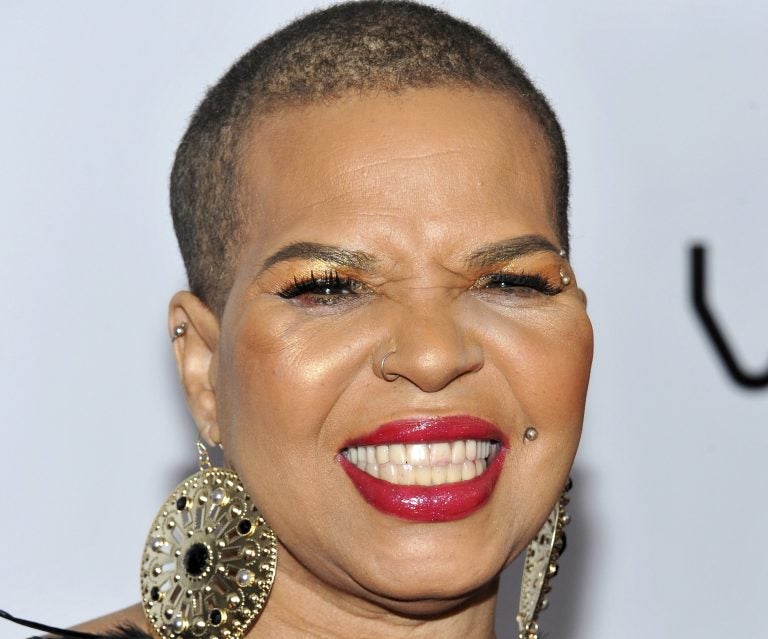The funny, flirtatious, caustic, impertinent and restlessly creative Ntozake Shange

In this Oct. 25, 2010, photo, author Ntozake Shange attends a special screening of "For Colored Girls" at the Ziegfeld Theatre in New York. Playwright, poet and author Shange, whose most acclaimed theater piece is the 1975 Tony Award-nominated play "For Colored Girls Who Have Considered Suicide/When the Rainbow is Enuf," died Saturday. She was 70. (AP Photo/Evan Agostini, file)
I knew Ntozake Shange many years ago. Her recent passing at age 70 made me reach back to remember those times. It’s no exaggeration to say that Shange was one of the most influential black female writers of her time.
Her 1976 play “For Colored Girls Who Have Considered Suicide/When the Rainbow Is Enuf” is one of the canonical works not just of black artistic expression, but overall. It was one of the first to center black women in the narrative and give voice to their specific challenges, heartbreaks and triumphs.
More than 40 years later, it resonates just as fiercely, especially now when social media has given black women an amplified voice.
Yvette Smalls Nichols, a master braider and proprietor of Positive Hair Designs in West Philadelphia, introduced us. She did Shange’s hair and mine. For Yvette, who died a few years ago, doing hair was not just about grooming it. She became your confidante, sister friend and nutritional counselor.
Yvette took me along to Shange’s home in the Chocolate Factory apartments, then considered one of Philadelphia’s luxury renovated buildings.
I’m slightly obsessed with home décor, so I remember the apartment well – big, bright windows, high ceilings, the now popular open room plan. Shange lived there with her young daughter, Savannah, now a professor at Rutgers University. I remember Savannah as a bright child, not a woman and college professor who is now almost 40.
Shange moved away from Philadelphia years ago, and Yvette and I fell out of touch after I moved out of her home. She’d given me a place to live as an expatriate New Yorker in Philly, and I stayed several months until I found a job and my own place. At the time, her husband, Richard, was managing a group called The Roots – you may have heard of them – and did so until he died in 2014.
That all these people intersected in my life speaks to the vitality of Philadelphia’s art and cultural scene at the time. Neo-soul was at its height — and Musiq, Kindred the Family Soul, Jill Scott, Bilal, The Roots and others were reconfiguring the Philadelphia music scene. Shange was part of that creative renaissance in Philly, teaching writing at Villanova and working with the Crossroads Theatre Company in New Brunswick.
Of course, I knew who she was. Born Paulette Linda Williams in Trenton on Oct. 18, 1948, Shange renamed herself using the Xhosa language of South Africa. Ntozake means “she who has her own things” and Shange means “she who walks with lions.” The combination suited her.
I was a young writer who had hopes of a career writing fiction. I revered women like her and Nikki Giovanni, who helped me see that writing was something black women could actually do as a career.
I met Zake, as friends called her, some 20 years after “For Colored Girls” debuted on Broadway, as only the second production by a black female playwright to do so. (The other was Lorraine Hansberry’s “A Raisin in The Sun.”)
“For Colored Girls” ultimately won an Obie Award in 1977. By then it had become a staple of theater productions everywhere. Though Shange wrote many other plays, books and poems, that play was the towering artistic achievement with which she was most closely associated.
Zake was funny, flirtatious, caustic, impertinent and restlessly creative — as people with that kind of talent usually are. She lived like a writer, surrounded by art and books and interesting people and conversations. Being around her was a real-life revelation that black women could make a living – and a decent one – in creative careers. She showed me what it looked like to be a writer, and it looked attainable. It’s what I’ve done my entire adult life – make a living with my words and my pen and then computer — and Zake was part of the reason I knew it could happen.
I was saddened to hear of her health issues and her passing. I read a piece recently where she detailed the aftermath of several strokes, including an almost decade-long confinement to her bed and home. Despite how heartbreaking that must have been, she carried on, still creating.
Ntozake was a vibrant woman and one who liked to look good. “For Colored Girls” was made into a movie in 2010 and in photos of her from the premiere, before illness made her immobile, she looks triumphant and incandescent. In her life, in her work, she was those things and more.
WHYY is your source for fact-based, in-depth journalism and information. As a nonprofit organization, we rely on financial support from readers like you. Please give today.




